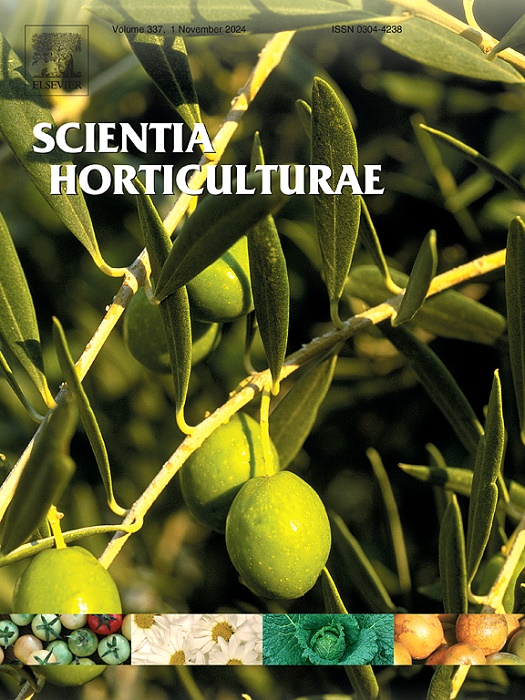曲霉木霉M7刺激常驻根瘤菌联合体,改变番茄果实代谢谱,提高采后番茄的糖酸比
IF 4.2
2区 农林科学
Q1 HORTICULTURE
引用次数: 0
摘要
番茄(Solanum lycopersicum L.)是一种全球种植的茄科水果作物,因其广泛的膳食应用和促进健康的特性而受到高度重视。近年来,消费者对营养食品选择的偏好不断升级,加上可支配收入的增加和对饮食健康意识的提高,极大地推动了对优质番茄品种的市场需求。因此,提高水果质量已成为确保农业和园艺部门竞争优势的关键决定因素。虽然利用木霉改善果实品质是一种环境友好的途径,但接种木霉影响果实品质的微生物生态机制和果实代谢谱尚不清楚。本研究主要从根际土壤微生物群落和果实代谢的角度探讨曲霉M7在番茄品质改良中的作用,揭示其潜在机制。结果表明,曲霉M7通过土壤微生物的作用提高了番茄果实的糖酸比,且这种提高与TM7a属和Candidatus_Saccharimonas相关显著。此外,应用曲霉M7可显著调节番茄果实代谢物合成途径。它显著地促进了碳水化合物和有机酸衍生物的生物合成,显著增加了特定化合物,如cdp -核糖醇、d-葡萄糖、纤维素二糖和草酰琥珀酸盐。此外,菌株M7提高了番茄果实糖代谢相关酶活性和基因表达。我们的研究结果为利用微生物提高果实品质的潜在策略提供了新的视角。本文章由计算机程序翻译,如有差异,请以英文原文为准。
Trichoderma asperellum M7 stimulates resident rhizobacterial consortia and alters the tomato fruit metabolic profile to enhance the sugar-acid ratio in postharvest tomatoes
Tomato (Solanum lycopersicum L.), a globally cultivated fruit crop of the nightshade family, is highly valued for its broad dietary applications and health-promoting properties. In recent years, escalating consumer preferences for nutritious food options, coupled with rising disposable incomes and heightened awareness of dietary wellness, have significantly driven market demand for superior-grade tomato varieties. Consequently, enhancing fruit quality has emerged as a critical determinant in securing competitive advantages within the agricultural and horticultural sectors. Although using Trichoderma to improve fruit quality is an environmentally friendly approach, the microbial ecological mechanisms and the fruit metabolic profile by which Trichoderma inoculation affects fruit quality remain unclear. This study primarily explores the role of Trichoderma asperellum M7 in improving tomato quality from the perspectives of rhizosphere soil microbial communities and fruit metabolism, revealing its potential mechanisms. It was found that T. asperellum M7 enhanced the sugar-acid ratio of tomato fruits through the action of soil microorganisms, and this increase was significantly correlated with the genera TM7a and Candidatus _Saccharimonas . Furthermore, the application of T. asperellum M7 was observed to significantly modulate metabolite synthesis pathways in tomato fruits. It notably enhanced the biosynthesis of carbohydrates and organic acid derivatives, with marked increases in specific compounds such as CDP-ribitol, d-glucose, cellobiose, and oxalosuccinate. Furthermore, strain M7 enhanced both the enzyme activity and gene expression associated with sugar metabolism in tomato fruits. Our research findings provided a new perspective on potential strategies for using microorganisms to enhance fruit quality.
求助全文
通过发布文献求助,成功后即可免费获取论文全文。
去求助
来源期刊

Scientia Horticulturae
农林科学-园艺
CiteScore
8.60
自引率
4.70%
发文量
796
审稿时长
47 days
期刊介绍:
Scientia Horticulturae is an international journal publishing research related to horticultural crops. Articles in the journal deal with open or protected production of vegetables, fruits, edible fungi and ornamentals under temperate, subtropical and tropical conditions. Papers in related areas (biochemistry, micropropagation, soil science, plant breeding, plant physiology, phytopathology, etc.) are considered, if they contain information of direct significance to horticulture. Papers on the technical aspects of horticulture (engineering, crop processing, storage, transport etc.) are accepted for publication only if they relate directly to the living product. In the case of plantation crops, those yielding a product that may be used fresh (e.g. tropical vegetables, citrus, bananas, and other fruits) will be considered, while those papers describing the processing of the product (e.g. rubber, tobacco, and quinine) will not. The scope of the journal includes all horticultural crops but does not include speciality crops such as, medicinal crops or forestry crops, such as bamboo. Basic molecular studies without any direct application in horticulture will not be considered for this journal.
 求助内容:
求助内容: 应助结果提醒方式:
应助结果提醒方式:


